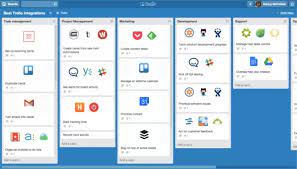The Importance of Management Software in Modern Business
In today’s fast-paced and competitive business environment, effective management is crucial for success. One key tool that has revolutionised the way businesses operate is management software. This technology has streamlined processes, enhanced efficiency, and improved decision-making across various industries.
Streamlining Operations
Management software automates routine tasks such as data entry, scheduling, and reporting, freeing up valuable time for employees to focus on more strategic activities. By centralising information and providing real-time updates, these tools enable seamless collaboration among team members and departments.
Enhancing Efficiency
With features like workflow automation and performance tracking, management software helps businesses identify bottlenecks, optimise workflows, and allocate resources more effectively. This leads to increased productivity and cost savings, giving companies a competitive edge in their respective markets.
Improving Decision-Making
Access to accurate and up-to-date data is essential for making informed decisions. Management software provides comprehensive analytics and reporting capabilities that enable managers to monitor key performance indicators, identify trends, and forecast future outcomes. This empowers organisations to make strategic decisions based on data-driven insights.
Ensuring Compliance
In highly regulated industries, compliance with legal requirements is non-negotiable. Management software helps businesses stay compliant by automating regulatory processes, maintaining audit trails, and generating compliance reports. This reduces the risk of non-compliance penalties and fosters a culture of transparency within the organisation.
Conclusion
Management software has become an indispensable tool for modern businesses looking to stay competitive and agile in today’s dynamic market landscape. By streamlining operations, enhancing efficiency, improving decision-making, and ensuring compliance, this technology empowers organisations to achieve their strategic goals effectively.
Six Key Tips for Selecting and Utilising Management Software Effectively in Your Business
- Choose a management software that aligns with your specific business needs and goals.
- Ensure the software is user-friendly and provides adequate training and support for your team.
- Regularly update the software to benefit from new features, improvements, and security patches.
- Integrate the management software with other tools and systems used in your organisation for seamless operations.
- Monitor usage and gather feedback from users to continuously improve processes and optimise performance.
- Have a backup plan in place in case of system failures or data loss to minimise disruptions to your business.
Choose a management software that aligns with your specific business needs and goals.
When selecting management software for your business, it is crucial to choose a solution that aligns with your specific needs and goals. By identifying the unique requirements of your organisation, you can ensure that the software not only meets your current operational challenges but also supports your long-term objectives. Tailoring the software to fit your business processes and strategic priorities can maximise its effectiveness in improving efficiency, enhancing decision-making, and driving overall success.
Ensure the software is user-friendly and provides adequate training and support for your team.
When implementing management software in your business, it is crucial to ensure that the chosen solution is user-friendly and accompanied by sufficient training and support for your team. User-friendly software enhances adoption rates and minimises resistance to change among employees, leading to smoother integration into daily operations. Additionally, providing adequate training and support equips your team with the necessary skills and knowledge to leverage the software’s full potential, ultimately maximising its benefits for your organisation. Prioritising user-friendliness and comprehensive support mechanisms can significantly contribute to the successful implementation and utilisation of management software within your company.
Regularly update the software to benefit from new features, improvements, and security patches.
To maximise the benefits of management software, it is essential to regularly update the system. By staying current with software updates, businesses can take advantage of new features that enhance functionality, improvements that boost performance, and security patches that protect against potential vulnerabilities. Keeping the software up-to-date ensures that organisations are equipped with the latest tools and safeguards to operate efficiently and securely in today’s ever-evolving business landscape.
Integrate the management software with other tools and systems used in your organisation for seamless operations.
To maximise the benefits of management software, it is essential to integrate it with other tools and systems utilised within your organisation. By integrating management software with existing systems, such as CRM platforms or project management tools, you can achieve seamless operations and enhance overall efficiency. This integration allows for streamlined data sharing, improved communication between different departments, and better coordination of tasks. Ultimately, integrating management software with other tools ensures a cohesive and interconnected workflow that optimises productivity and facilitates better decision-making processes.
Monitor usage and gather feedback from users to continuously improve processes and optimise performance.
To maximise the effectiveness of management software, it is essential to monitor its usage and gather feedback from users regularly. By tracking how the software is being utilised and listening to user feedback, businesses can identify areas for improvement, address pain points, and optimise processes to enhance overall performance. This iterative approach not only ensures that the software meets the evolving needs of the organisation but also fosters a culture of continuous improvement and innovation within the company.
Have a backup plan in place in case of system failures or data loss to minimise disruptions to your business.
Having a backup plan in place is essential when utilising management software to ensure the continuity of your business operations. In the event of system failures or data loss, having a reliable backup strategy can minimise disruptions and prevent potential setbacks. By implementing robust backup procedures, businesses can safeguard their critical information and quickly restore functionality, allowing them to maintain productivity and mitigate any unforeseen challenges effectively.

